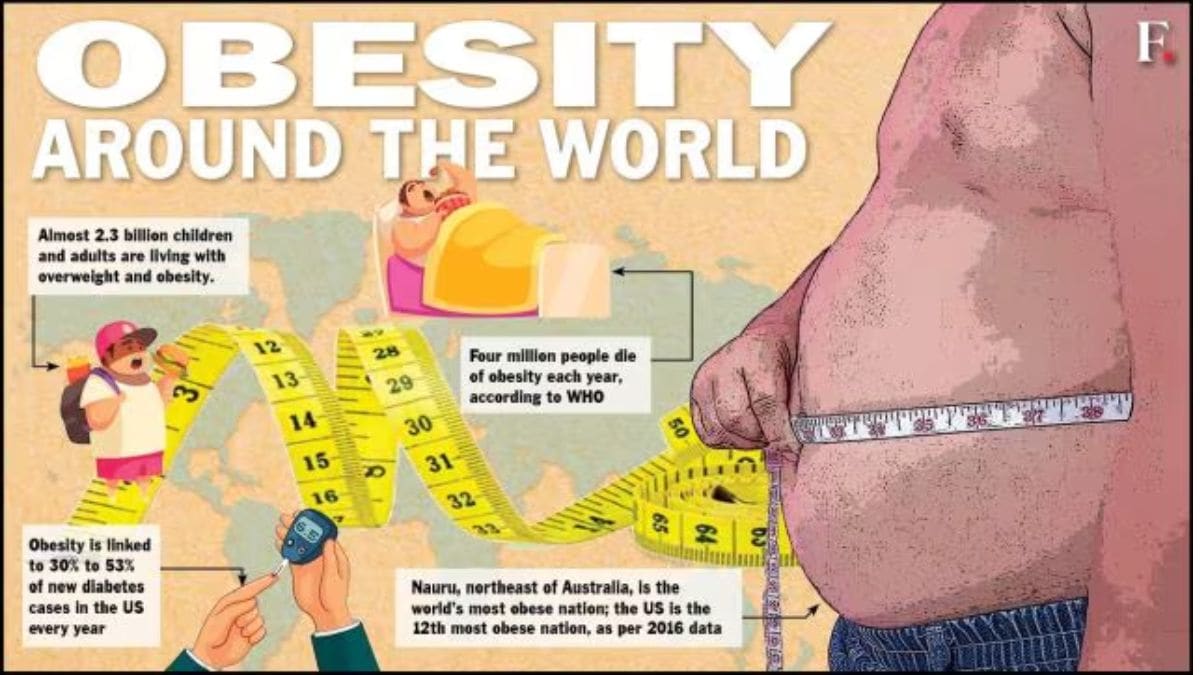In the last few decades,
obesity has evolved from a localised public health issue to an international epidemic. According to World Health Organisation (WHO), 1 in 8 people worldwide living with obesity. Adult obesity has more than doubled since 1990, and adolescent obesity has quadrupled over the same period. In total, 2.5 billion adults were classified as overweight last year, including 890 million living with obesity.
Countries with the highest combined rates of underweight and obesity in 2022 were island nations in the Pacific and the Caribbean and those in the Middle East and North Africa.
According to data, among adults aged 18 years and older, 43% were overweight, and 16% were living with obesity. The figures for children are equally concerning—37 million children under the age of 5 were reported as overweight in 2022. Additionally, over 390 million children and adolescents aged 5 to 19 years were overweight, of which 160 million were living with obesity.
While the obesity rates in India have also witnessed an upward direction. According to National Family Health Survey (NFHS-5) 2019-2021, around 24% of women and 22.9% of men aged 15–49 are now considered overweight or obese, showing an increase from the previous survey in 2015-16, where 20.6% of women and 18.9% of men were affected.
Watch Also: Obesity Has Become a Public Health Crisis with More Youngsters in Danger | Vantage with Palki Sharma
Obesity is now recognised as a serious health condition that profoundly elevates the threat of heart disease, type 2 diabetes, stroke and even cancers.
Dr Mohit Bhandari, Chief of Bariatric Surgeon at Pristyn Care shared insights with Firstpost on various aspects surrounding the issues.
Changes in dietary patterns
Dr Bhandari: Probably, the most important cause of this rising tide of obesity is the dramatic change in global dietary patterns. With economic development and urbanisation, diets rich in fruits, vegetables, whole grains are replaced by these rather processed, high-calorie, and sugar-laden foods. Fast-food chains, sugary beverages, and ultra-processed snacks become more accessible and affordable in low- and middle-income countries. This is feeding into high-energy, nutrient-poor diets that fuel weight gain and obesity, particularly in the cities.
Increasing trend of sedentary lifestyle
Dr Bhandari: The other important factor is an increasing trend of sedentary lifestyle. The invention of modern technology has completely changed the way one lives, works, communicates, and entertains himself or herself. However, it greatly reduces the need for physical exercise. Such jobs in the office, buying on the internet, and streaming content encourage long sitting, but hard activities of the past years, which include walking and physical movements, have reduced. This low energy expenditure with high food consumption leads to gaining weight.
Environmental and socioeconomic factors
Dr Bhandari: The environment in which a person lives also contributes to obesity. Urbanisation has consequently created settings that discourage active physical activity the most. Without a conducive safe space for walking, biking, or exercising within many cities, the convenience stores and fast food tend to outweigh fresh food markets, thereby creating a food desert effect.
Genetics and biological factors
Dr Bhandari: Lifestyle and environmental factors have been important components of the story, but genetics also predispose individuals to be at higher risk for obesity. Perhaps some individuals have genetic factors that increase their likelihood of gaining weight or even have slower metabolisms. They may be more sensitized biologically and have a stronger urge to eat more. Hormonal problems, such as hypothyroidism or PCOS, also cause weight gain and make it a challenge for one to lose weight.
Psychosocial and behavioural factors
Dr Bhandari: Mental problems like stress, depression, and anxiety trigger conditions of over-eating or poorly eaten foods leading to more cases of obesity. Emotional eating is thus common as people over-eat comfort foods that contain so much fat and sugar, and so get conditioned to eat due to stress or bad feelings. Behavioural factors include poor eating habits or strategies, such as not eating at set times, consuming food at very late hours, and missing meals.
Obesity is a complex issue influenced by many factors, including diet, lifestyle, environment, genetics, and mental health. To address this growing epidemic, both individuals and societies need to prioritize healthier eating habits, increased physical activity, and the creation of environments that support well-being. It is crucial to focus on these key factors to prevent and manage obesity on a global scale.
